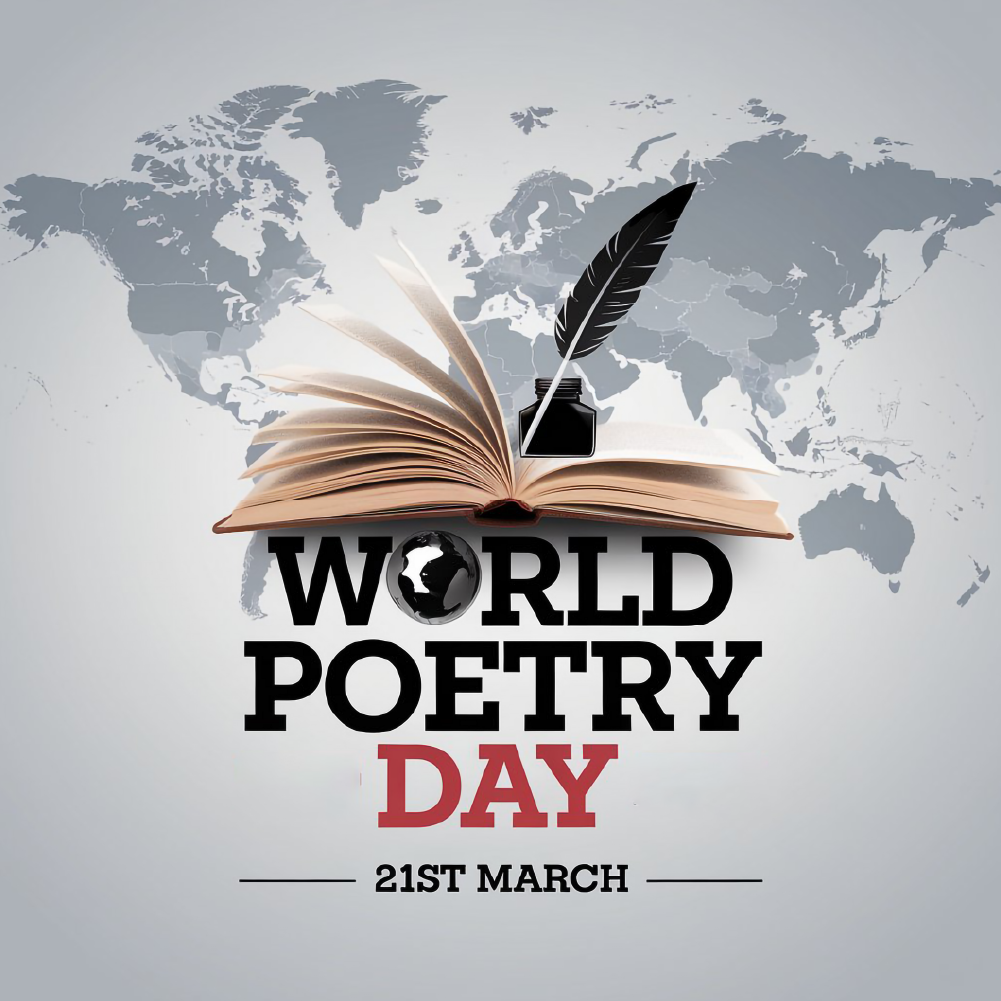Poetry has long served as a powerful tool for self-expression, cultural preservation, and social change. In 2025, UNESCO has chosen the theme “Poetry as a Bridge for Peace and Inclusion” for World Poetry Day, celebrated on March 21. This theme underscores poetry’s ability to transcend borders, foster understanding, and unite people from diverse backgrounds. Poetry is more than just words on a page—it carries the emotions, struggles, and triumphs of societies and individuals. By promoting poetry, we can nurture cross-cultural dialogues, inspire change, and create a more inclusive world. This year’s theme emphasizes poetry’s unique role in bridging differences and fostering unity. Events, workshops, and literary initiatives worldwide will be dedicated to highlighting poetry as a tool for social harmony and inclusion. Whether through written verse, spoken word performances, or multilingual publications, World Poetry Day 2025 will celebrate the power of poetry to heal, connect, and transform communities.
What Date is National Poetry Day?
Apart from World Poetry Day, another significant day for poetry lovers is National Poetry Day, which is observed annually on the first Thursday of October. In 2025, this special day falls on October 3rd, offering poets and enthusiasts a mid-week opportunity to immerse themselves in poetic activities. National Poetry Day serves as a moment to appreciate and acknowledge the role of poetry in our daily lives. Schools, libraries, and cultural institutions across the globe take part in activities that promote poetry, such as public readings, workshops, and competitions. This annual celebration encourages people from all walks of life to engage with poetry, whether by reading classic works, composing their own verses, or discovering new poets. The day also serves as a platform to uplift underrepresented voices and highlight poetry’s role in social activism and personal growth. National Poetry Day 2025 will undoubtedly bring together seasoned poets, aspiring writers, and poetry enthusiasts to celebrate the art form in diverse and engaging ways.
The Theme for World Poetry Day 2025
UNESCO’s theme for World Poetry Day 2025, “Poetry as a Bridge for Peace and Inclusion”, highlights the role of poetry in promoting harmony and social integration. Poetry has a profound ability to connect individuals across cultures, languages, and personal experiences, making it a crucial medium for fostering understanding and inclusivity. This year’s theme focuses on using poetry as a tool to break barriers and create spaces where diverse voices can be heard and appreciated.
The focus will be on:
- Encouraging educational programs centered on poetry, particularly in schools and universities.
- Publishing and sharing works in lesser-known languages to preserve linguistic diversity and cultural heritage.
- Using poetry as a medium to address social issues such as inequality, discrimination, and conflict resolution.
- Creating global poetry exchange programs that bring together poets from different backgrounds.
- Organizing workshops, public readings, and online campaigns to promote poetic expression and storytelling.
By celebrating poetry as a unifying force, World Poetry Day 2025 aims to encourage more people to explore the beauty of poetic expression, recognize its impact on society, and use it to advocate for peace and social inclusion.

What to Do for World Poetry Day?
Celebrating World Poetry Day can take many forms. Whether you are an experienced poet or someone who simply enjoys reading poetry, there are numerous ways to participate in this global celebration. Here are some engaging ways to take part:
- Attend Poetry Readings and Slams – Many communities and literary organizations host poetry readings where poets can share their work. Attending such events allows you to experience different poetic styles and hear powerful performances.
- Write and Share Poetry – Whether online or in-person, sharing your poetic expressions can inspire and connect others. Posting your poetry on social media, submitting it to literary magazines, or reading it at an open mic event can be great ways to celebrate.
- Support Emerging Poets – Buying poetry collections, sharing poets’ works, and engaging with new poetry releases can help keep the art alive and thriving.
- Engage in Workshops – Poetry workshops help refine skills and encourage collaboration between writers. Learning new techniques and receiving feedback can enhance one’s poetic voice.
- Translate and Share Poetry – Bringing poetry from different cultures and languages into the mainstream fosters global inclusivity. If you know multiple languages, translating poetry can be a valuable way to promote literary diversity.
- Encourage Poetry in Schools – Teachers can organize poetry competitions, encourage students to write their own verses and introduce them to diverse poets worldwide.
By participating in World Poetry Day activities, individuals and communities can help uphold poetry’s role as a bridge for peace and inclusion, ensuring that its impact continues to be felt across generations.
The Origins of World Poetry Day
World Poetry Day was established by UNESCO in 1999 to celebrate the art of poetry and its impact on societies. The day recognizes poetry as a fundamental form of cultural and linguistic expression and aims to support endangered languages while promoting literary appreciation worldwide. Poetry has been an integral part of human history, used to convey emotions, tell stories, and reflect on society. From ancient civilizations to modern digital platforms, poetry has evolved but remains a vital artistic form.
UNESCO’s decision to dedicate a global day to poetry was driven by the need to preserve poetic traditions, encourage new forms of poetic expression, and promote the teaching of poetry. Over the years, World Poetry Day has grown into an international celebration, with poets, writers, and literary enthusiasts coming together to honor the power of verse.
By recognizing poetry as a universal form of artistic and cultural expression, World Poetry Day continues to inspire people worldwide to read, write, and appreciate poetry. The observance serves as a reminder of poetry’s ability to capture the human experience, inspire creativity, and serve as a tool for change.
Who Wrote the First Poem?
The earliest known poem dates back to ancient Mesopotamia. The Epic of Gilgamesh, written around 2100 BCE in Sumerian, is considered the world’s first recorded poem. This epic narrates the adventures of King Gilgamesh and explores themes of heroism, friendship, and mortality. It is a significant literary artifact that provides insight into early human storytelling and poetic traditions. The oral tradition of poetry likely predates recorded history, with many ancient civilizations using poetry to convey religious beliefs, myths, and societal values.
The Three Types of Poetry
Poetry can be classified into three primary types:
- Lyric Poetry – Expresses personal emotions and thoughts. Examples include sonnets and odes.
- Narrative Poetry – Tells a story, often in epic form, such as “The Odyssey” by Homer.
- Dramatic Poetry – Written for theatrical performance, like Shakespeare’s plays.
Why is Poetry So Famous?
Poetry remains a celebrated literary form due to its emotional depth, artistic beauty, and ability to convey complex ideas concisely. It resonates across cultures and generations, influencing music, literature, and even politics. Additionally, poetry’s accessibility makes it a universal art form, adaptable to both written and spoken traditions.
Conclusion
As World Poetry Day 2025 approaches, embracing the theme “Poetry as a Bridge for Peace and Inclusion” offers an opportunity to celebrate poetry’s transformative power. Through literature, we can foster peace, inclusion, and a shared appreciation for diverse voices worldwide.
FAQs
1. When is World Poetry Day 2025?
World Poetry Day is observed on March 21, 2025.
2. When is National Poetry Day 2025?
National Poetry Day falls on October 3, 2025.
3. What is the theme of World Poetry Day 2025?
The theme is “Poetry as a Bridge for Peace and Inclusion.”
4. Who wrote the first poem?
The Epic of Gilgamesh, written around 2100 BCE, is considered the first recorded poem.
5. Why was World Poetry Day established?
UNESCO founded World Poetry Day in 1999 to promote the reading, writing, and appreciation of poetry worldwide.



